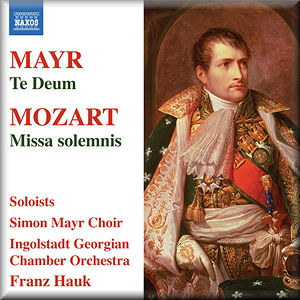 |
 |
|


alternatively
CD: MDT
AmazonUK
AmazonUS
Sound
Samples & Downloads
|
Wolfgang Amadeus MOZART (1756-1791)
(attrib.)
Missa solemnis in C, KV.C1.20 (ed. Martin Sokoll and Franz
Hauk) [43:37]
Simon MAYR (1763-1845)
Te Deum in D (1805) (ed. Franz Hauk) [24:28]
 Priska Eser-Streit, Katja Stuber (sopranos)
Priska Eser-Streit, Katja Stuber (sopranos)
Merit Ostermann, Roland Schneider (altos)
Andreas Hirtreiter, Marc Megele, Jörg Schneider (tenors)
Robert Merwald, Andreas Burkhart (basses)
Simon Mayr Choir
Ingolstadt Georgian Chamber Orchestra/Franz Hauk (organ)
rec. Asamkirche Maria de Victoria, Ingolstadt, Germany, 29 September
- 1 October 2007. DDD.
Texts and translations included.
 NAXOS 8.570926 [68:05]
NAXOS 8.570926 [68:05] 
|
|
|
Simon Mayr wrote ‘Mozart’ on his copy of the Missa Solemnis
in C which opens this recording. It remains an open question
whether he meant Leopold or Wolfgang Amadeus – another copy
in Salzburg contains the name Wolfgang Amadeus, crossed out
and replaced with his father’s name. Whichever Mozart we attribute
it to – or even Brixi, Vogel or Vogler, who have all been candidates
at one time or another – it’s a fine work.
Keith Anderson maintains a scholarly aloofness in his notes,
merely noting that modern research supports the possible attribution
to one or other Mozart. Having been trained in circumspection
at the learned institution where Mr Anderson now teaches, I’m
merely going to say that the music sounds to me worthy to have
been written by Mozart fils – I’m even prepared to rate
it higher than some of the short Masses which he composed in
Salzburg. Naxos don’t claim it as a first recording, but I don’t
recall ever hearing it before.
Mayr’s Te Deum is fully worthy to be heard in the same
company. Again, there are some caveats about the theory that
it was performed at Napoleon’s coronation as King of Italy –
some have dated the work as late as the 1820s – but it certainly
sounds good enough to have been written for such a grand occasion,
and it provides a good reason to grace the front cover with
an impressive portrait of Napoleon in his coronation robes.
It’s a jaunty work, at times reminiscent of secular opera rather
than church music – listen to track 22, Te ergo quæsumus,
where you might almost be listening to an ensemble passage from
Figaro. The concluding section, In te Domine speravi
(tr.23) dances us to a hope that we shall, indeed, never be
confounded.
Naxos have been doing Simon Mayr proud in recent years and several
of their releases have been made under the direction of Franz
Hauk, as here – a busy man who acts as scholarly editor, chorus-master,
conductor and keyboard player on the harpsichord or, this time,
the organ. His version of Tobiæ Matrimonium, the Marriage
of Tobias, was hailed by Glyn Pursglove as an outstanding bargain
(8.570752/53 - see review)
and by Robert Hugill as a delight, charmingly performed (see
review).
An earlier recording, David in spelunca Engaddi, David
in the cave of Engedi, earned equally high praise from Göran
Forsling (8.570366/67 - see review).
Hauk has also recorded Mayr’s dramatic cantata L’Armonia
and the Cantata for the Death of Beethoven on 8.557958.
I must catch up with those earlier releases – they are all available
from the Naxos Music Library.
The performances here are generally good; though one or two
of the soloists are a little over-exposed – Merit Ostermann
in Gratias agimus (tr.3), for example, though she sounds
fine in ensemble. I was never really disturbed, and the generally
high standard easily outweighs the minor disadvantages. I have
to say that I find the Germano/Austrian pronunciation of the
hard g in Agnus annoying, though I accept that
that is what Mozart (or whoever) and Mayr would have expected.
The performers compromise by pronouncing the soft Italian c
in cœli rather than the usual Germanic ts sound
which, oddly enough, I don’t mind.
The orchestral support is good. The Ingolstadt Georgian Orchestra
moved from Tblisi to the nearest large town to Mayr’s birthplace
in 1990, so the ‘Georgian’ element of their name refers to their
origin, not to their existence as a period-instrument ensemble.
Nevertheless, I have little but praise for their part in the
success of this recording.
Above all, however, it’s Franz Hauk who must take the major
part of the credit, having co-edited the ‘Mozart’ and edited
the Mayr, trained the Simon Mayr Choir, which he founded in
2003, and conducted the orchestra from the organ. Above all,
he keeps up the momentum in both works. I trust that he and
Naxos will go on to make us even more aware of the quality of
Mayr’s music.
The recording is good throughout – Naxos seem to have become
at home in the church which was used for this and their earlier
Mayr recordings, in Mayr’s own home town of Ingolstadt.
The notes are brief – just one page each in English and German,
but Keith Anderson’s authorship guarantees their value. I just
wish that he had plumped for or against Mozartian authorship
of the Mass. The complete texts and English translations of
the Mass and Te Deum are given, mostly using the familiar
Book of Common Prayer texts – no need to search for them online
for once. I’m not sure why it was thought necessary to replace
‘I acknowledge one baptism’ with ‘I confess’, an over-literal
rendering of Confiteor.
I am grateful to all concerned for the opportunity to hear the
‘Mozart’ Mass and the Mayr Te Deum. That’s twice in recent
weeks that Naxos have pulled off the trick for me with music
of this period: the first time was with their recording of the
Haydn ‘Nelson’ Mass and Nikolaimesse (8.572123). I made
that earlier recording Bargain of the Month and the delightful
new CD is not far behind.
Brian Wilson
|
|
|




 All Nimbus reviews
All Nimbus reviews








